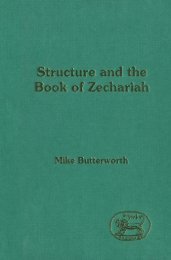Appendix CASE ONE - Collection Point® | The Total Digital Asset ...
Appendix CASE ONE - Collection Point® | The Total Digital Asset ...
Appendix CASE ONE - Collection Point® | The Total Digital Asset ...
You also want an ePaper? Increase the reach of your titles
YUMPU automatically turns print PDFs into web optimized ePapers that Google loves.
Chapter 10<br />
Macaulay's 'Utilitarian' Indian Penal Code:<br />
An Illustration of the Accidental Function of Time,<br />
Place and Personalities inLawMaking1<br />
K.J.M. Smith<br />
This essay attempts to examine both the historical and intellectual forces<br />
responsible for producing Thomas Macaulay's 1837 Indian Penal Code, finally<br />
enacted in 1860. Macaulay's Code and its creative antecedents are worthy<br />
of our interest because together they constitute a curious and important<br />
episode in the development or evolution of criminal jurisprudence and, more<br />
generally, in nineteenth century intellectual history.<br />
<strong>The</strong> shaping forces behind the Code included, most particularly, a dynamic<br />
mixture of time, place, and personalities: Time' in the sense of the 1830s being<br />
a period when a broad reforming spirit had infected at least some in positions<br />
of power and influence, and when commissions of enquiry, of one form or<br />
another, were much in vogue as the standard technique for ascertaining the<br />
nature, if not always the solution, of specific social problems; 'Place' in the<br />
sense that legislating for India obviously raised issues and necessitated meeting<br />
difficulties peculiar to that part of what later became the 'Empire'. <strong>The</strong> third,<br />
and perhaps most potent of these formative influences, were the personalities<br />
and individual philosophies of the leading participants: Macaulay, James<br />
Mill, then occupying a pivotal position in the East India Company, and the<br />
strong posthumous presence of Bentham, who died in 1832, two years before<br />
Macaulay's Indian interlude began.<br />
/. <strong>The</strong> Circumstances of Macaulay's Appointment<br />
Appreciation of the cardinal features of the political and philosophical climate<br />
in which the Code was produced is aided by a glance back at the immediate<br />
history of the 1833 Charter Act which created the post of legal member of the<br />
Governor-General's Legislative and Executive Council of India, first occupied<br />
by Macaulay.<br />
Prior to the 1833 Act India enjoyed, or suffered, diversified government<br />
with no centralized Indian-based authority; the various provinces were ruled<br />
1 With acknowledgements to Bentham's 'On the Influence of Time and Place in Matters of<br />
Legislation', Works of Jeremy Bentham, J. Bowring, ed. (Edinburgh and London, 1843), (hereafter<br />
Works), i, 169.






